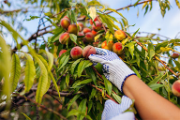Farmers in Switzerland are adapting to meet the challenges of today, from new consumer demands to environmental concerns. In specialist schools, training is evolving to carry on the transition towards more sustainable models.

Whether it is organic farming, integrated production, or a reduction in production input, the 150,000 professionals who work on Switzerland's 48,000 farms have begun a transition to these more responsible production models. "The movement has intensified in recent years, but all producers began to make an effort in the 1990s," explains Pascal Toffel, director of the Grangeneuve Agricultural Institute (in German) in Fribourg. Consumers want healthier products, not necessarily organically grown, but with a minimum of sanitary additives and products." Regulatory changes reflect this shift in thinking: the federal law on the reduction of risks associated with the use of pesticides (in German), which was passed in 2021, provides for various measures to reduce the use of pesticides by at least 20% by 2030.
To achieve the goal, specialist schools are adapting, says Markus Waber, deputy director of the Swiss Vegetable Growers' Union (in German) in Bern, the trade organization for Swiss fruit and vegetable growers. "The curriculum for all agricultural professions is currently undergoing a major revision, due for completion in late 2024. Organic farming will be fully integrated into them and all students will share the same basic training, regardless of their specialty." The profession is evolving, but he warns that no miracle model exists: "Targeted spraying, selection of more resistant or higher-yielding varieties, robots, crop nets... Only a combination of different methods will make it possible to reduce the use of phytosanitary products without reducing yields."
Signature projects
A vast effort is being made to test the most promising solutions on the ground in conjunction with laboratories and research institutes. "We don't have the necessary legitimacy to carry out R&D projects, which are the responsibility of FiBL or Agroscope," explains Pascal Toffel from Fribourg. "But we do work with them and we make crop plots available to multiply demonstration trials, test their solutions, and explain their efficacy to farmers. We act as a relay between applied research and the agricultural world."
At the School of Horticulture in Lullier (GE), Jean-Marc Vuillod, a Master of Horticulture, has been working for several years on a rather unusual project: the use of human urine, transformed and stabilized to convert ammonium into nitrate, before being used as a natural fertilizer. Approved by the Federal Office of Agriculture for the fertilization of vegetables and flowers, and already marketed by the ETH Zurich spin-off company Vuna, the final product is in a concentrated, odorless form and ready to be diluted. Behind the quaint nature of the experiment, the interest is real, explains Jean-Marc Vuillod: "The price of nitrogen has already doubled and we cannot feed the earth without finding new solutions. Urine is one of them, as is the recycling of purified sludge in wastewater treatment plants. Trials, for basil, strawberries, and lettuce, are continuing with promising results in new directions.
Evolution also includes technology and robotics. At Lullier, Jean-Marc Vuillod, in collaboration with the Geneva University of Applied Sciences, wants to test a localized irrigation robot that can inject water as close to the plant as possible, thus reducing the consumption of a resource that is likely to become scarcer with global warming. In Charmey (FR), another project launched by the UMS, the Vegetable Research Forum and the Swiss Vegetable Growers' Centre is looking at targeted spraying of phytosanitary products or spot spraying. A tractor-drawn prototype has been tested and improved since 2018, with the aim of reducing the amount of insecticides used on various crops such as bok choy, celery and parsley. The results have been positive: the tests have saved large amounts of pesticides in row crops, without any decrease in efficiency. Digitalization is thus also becoming a reality in agriculture. It remains to be seen whether every farm will be able to afford such technological solutions, whose cost is not negligible.
Information
On the theme
Organic is gaining ground
Figures from the Federal Statistical Office are clear: organic farming continues to make headway in Switzerland. 7,670 of the country's 48,864 farms (15%) practice this method. With 181,400 hectares of land under organic cultivation, the share of the total agricultural area (UAA) has increased to 17%, a proportion that is exceptionally high in Europe. The increase is particularly noticeable for soybeans and in the wine sector: with 2,240 hectares cultivated, the proportion of organic labels in vineyards has doubled in four years.
Last modification 06.07.2022





